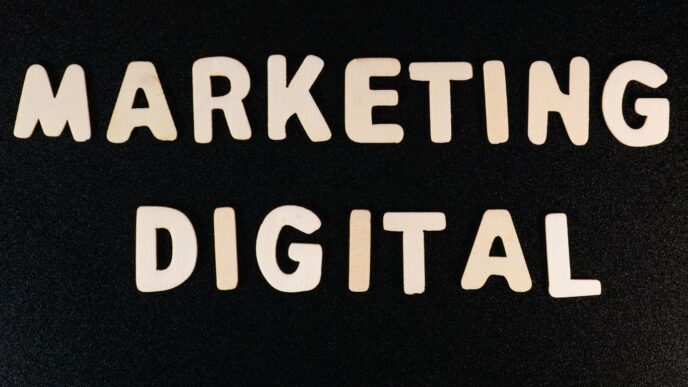Getting a digital marketing agency agreement right is pretty important. It’s not just some boring legal paper you sign and forget about. This agreement is basically the rulebook for how you and your agency will work together. If it’s not clear, you can end up with a lot of headaches later on, like missed deadlines or unexpected costs. We’re going to break down what really matters in these contracts so you can work with your agency smoothly and get the results you want.
Key Takeaways
- Make sure your digital marketing agency agreement clearly spells out exactly what services the agency will provide and what results you can expect.
- Understand who owns the content and any other work created during the project. This is a big one for protecting your brand.
- Know the payment schedule and what happens if either side doesn’t meet their end of the deal. This avoids money arguments.
- Always review the entire digital marketing agency agreement carefully before signing. Look for anything that seems unclear or unfair.
- Keep the lines of communication open with your agency. It’s also smart to update the agreement if your business or the market changes.
Understanding The Core Components Of Your Digital Marketing Agency Agreement
When you bring on a digital marketing agency, you’re not just hiring someone to post on social media. You’re entering into a partnership, and like any good partnership, it needs a solid foundation. That foundation is your agency agreement. Getting this right from the start means fewer headaches later on. It’s all about making sure everyone’s on the same page about what’s expected, what’s being done, and how success will be measured. Think of it as the blueprint for your entire marketing campaign.
Defining The Scope Of Services
This is where you get specific about what the agency will actually do. It’s not enough to say ‘social media management.’ You need to break it down. What platforms? What kind of content? How often will they post? Will it include paid advertising? This section should clearly list all the services the agency is contracted to provide. It’s also a good place to mention what’s not included, to avoid any confusion down the line. For example, if the agency is handling your SEO, does that include content writing, or is that a separate service?
Establishing Clear Deliverables And Timelines
Beyond just listing services, you need to know what the tangible results will be and when you can expect them. Deliverables are the specific outputs of the agency’s work. This could be a monthly report, a set number of blog posts, a certain number of ad creatives, or a specific increase in website traffic. Alongside each deliverable, you need a timeline. When will that report be ready? When will those blog posts be published? Having these clearly defined helps keep the agency accountable and allows you to track progress effectively. It’s also helpful to outline how progress will be reported, like weekly check-ins or monthly performance reviews. This helps you stay informed about how your social media presence is growing.
Outlining Payment Terms And Conditions
Money talks, right? This part of the agreement needs to be crystal clear. How much will you pay? When are payments due? Will it be a fixed monthly fee, an hourly rate, or performance-based? If it’s performance-based, what are the metrics that trigger payment? You also need to consider things like late payment penalties or early payment discounts. Some agreements might also include a retainer fee, which is a set amount paid regularly for ongoing services. Understanding the payment structure is key to managing your budget and avoiding unexpected costs. It’s important to compare different agency pricing models to find what works best for your business.
A well-defined agreement acts as a roadmap, guiding both parties toward shared objectives and preventing misunderstandings that can derail even the most promising marketing initiatives. It’s about setting expectations upfront so that the focus can remain on achieving results.
Navigating Key Clauses In A Digital Marketing Agency Agreement
When you’re setting up a deal with a digital marketing agency, there are a few specific parts of the contract you really need to pay attention to. These aren’t just filler; they actually protect both you and the agency, making sure everyone knows what’s what and what could happen if things go sideways. Getting these right from the start means fewer headaches later on.
Intellectual Property Rights Ownership
This is a big one. Who actually owns the work the agency creates for you? Does the agency keep rights to the templates or processes they used? The contract needs to be super clear about who owns the final deliverables, like website copy, ad creatives, or social media posts. Sometimes, the client owns everything outright, but the agency might want to keep rights to their underlying methods or tools. It’s important to have this spelled out to avoid any confusion or disputes down the road. For instance, if you’re building an online business, securing your URL and making sure your website development contract clearly states your ownership is key. Protecting your brand starts with understanding who owns what.
Confidentiality and Non-Disclosure Provisions
Agencies often get access to your company’s private information – sales figures, customer lists, future plans, you name it. A confidentiality clause, often called a Non-Disclosure Agreement (NDA) within the contract, makes sure that information stays private. It should clearly state what kind of information is considered confidential and for how long that confidentiality lasts. Is it just during the project, or does it extend indefinitely? This protects your competitive edge and keeps sensitive business data from getting out.
Indemnity and Liability Considerations
This part deals with who is responsible if something goes wrong. Indemnity clauses basically say that one party will cover the costs if the other party gets sued because of something related to the agreement. For example, if an agency uses an image in an ad campaign that turns out to be copyrighted without permission, they might have to indemnify you if you get sued. Similarly, you might have responsibilities too. It’s about fairly assigning risk. The contract should also include a limitation of liability, which caps the amount of money one party can be held responsible for if they breach the contract. This is a standard practice that courts usually uphold.
It’s easy to just skim over these legal bits, but they are really important for setting clear boundaries and expectations. Think of them as the rulebook for your partnership.
Ensuring Mutual Understanding Through Agreement Review

Going over your digital marketing agency agreement with a fine-tooth comb is a really smart move. It’s not just about signing on the dotted line; it’s about making sure everyone’s on the same page before any work even begins. Skipping this step can lead to all sorts of headaches down the road, like missed deadlines, unexpected costs, or even legal squabbles. Think of it as laying a solid foundation for your partnership.
Identifying Potential Pitfalls In Marketing Contracts
Lots of marketing contracts have hidden traps that can trip you up. One big one is vague language. You know, terms like “improve engagement” or “boost brand awareness.” What does that actually mean? It’s way better to have specific, measurable goals. For instance, instead of “improve engagement,” aim for “increase social media comment rate by 15% in Q3.” Another common problem is setting unrealistic expectations for deliverables. Promising the moon without a clear plan or sufficient budget is a recipe for disaster. Also, payment terms can get messy if they aren’t tied directly to specific achievements or milestones. Ambiguous payment schedules can cause serious friction.
A thorough review helps prevent disputes and ensures that both parties have a clear picture of what’s expected and what will be delivered.
Best Practices For A Thorough Agreement Review
So, how do you actually do a good review? First off, get everyone involved who needs to be. That means your marketing team, legal folks, and maybe even finance. Everyone has a different perspective that’s important. Set clear goals for what you want to get out of the review itself. Are you focused on the payment schedule, the scope of work, or something else? Make sure the agreement is updated regularly, too, especially if your business goals change or the market shifts. It’s like keeping your car tuned up – you don’t wait for it to break down.
- Involve all relevant departments (marketing, legal, finance).
- Define specific, measurable objectives for the review.
- Regularly update the agreement to reflect business changes.
Leveraging Technology For Efficient Contract Evaluation
Honestly, manually checking every single clause can be a real drag. That’s where technology comes in handy. There are tools out there, like AI contract review software, that can speed things up a lot. These programs can scan through the agreement and automatically flag important sections, like payment terms or intellectual property rights. They can even spot tricky language or clauses that might cause problems later on. This doesn’t mean you can skip the human element entirely, but it does free up your team to focus on the more complex stuff, like negotiating key terms or handling unique situations. It’s a great way to make sure you don’t miss anything important and can help you compare agency offerings more effectively.
- Automate clause identification.
- Flag potential risks and ambiguous language.
- Reduce manual review time and human error.
Defining Roles And Responsibilities In Your Digital Marketing Agency Agreement
When you bring on a digital marketing agency, it’s easy to get caught up in the excitement of new campaigns and strategies. But before you dive in, it’s super important to get crystal clear on who’s doing what. This isn’t just about avoiding confusion; it’s about setting up a partnership that actually works.
Clarifying Party Obligations and Expectations
Think of this as the foundation of your working relationship. You need to spell out exactly what the agency is expected to do and what you, as the client, need to provide. This means going beyond just listing services. For example, if the agency is handling your social media, what does that entail? Daily posts? Engagement with followers? Reporting on metrics? On your end, what kind of content will you supply? What approvals are needed, and by when? Being specific here stops assumptions from causing problems later on. It’s about making sure both sides know their part in the whole operation.
A well-defined contract protects both the agency and the client from misunderstandings. It acts as a roadmap, guiding the collaboration and minimizing potential disputes.
Specifying Agency Performance Metrics
How will you know if the agency is actually doing a good job? This is where performance metrics come in. You can’t just say ‘improve our website traffic.’ You need measurable goals. These could be things like:
- Increasing website organic traffic by 15% within six months.
- Achieving a click-through rate of 2% on all paid search campaigns.
- Growing social media engagement by 10% quarter-over-quarter.
These metrics should be realistic and directly tied to the services the agency is providing. It’s also a good idea to agree on how these metrics will be tracked and reported. This keeps everyone accountable and focused on results. You can find more information on setting up a marketing contract that includes these details.
Addressing Client Responsibilities and Cooperation
It’s not all on the agency, though. Your cooperation is key to their success. The agreement should clearly state what you need to do. This might include:
- Providing timely feedback on creative assets and campaign strategies.
- Supplying necessary brand assets, product information, and access to existing marketing platforms.
- Making timely payments according to the agreed-upon schedule.
If you don’t hold up your end, it can directly impact the agency’s ability to perform. So, be honest about what you can commit to and make sure it’s written down. This mutual commitment is what makes the partnership effective.
Managing The Lifecycle Of Your Digital Marketing Agency Agreement
So, you’ve got this digital marketing agency agreement all signed and sealed. That’s great, but it’s not exactly the finish line. Think of it more like the starting pistol firing. A contract isn’t just a document to get signed; it’s a living thing that needs to be managed from start to finish, and sometimes, even beyond. Getting this right means fewer headaches later and a smoother working relationship for everyone involved.
Termination Clauses And Exit Strategies
This is the part nobody likes to think about, but it’s super important. What happens if things just aren’t working out? You need to know how either party can end the agreement. This usually involves a notice period – like, you have to tell the other person you want out X days in advance. Sometimes there are penalties for ending early, especially if you’re the one breaking the contract. It’s also good to think about what happens to all the work that’s been done. Who owns it? Does the agency get paid for what they’ve completed? Having clear rules here stops arguments later. It’s mission-critical for your agency to prioritize binding, thorough contracts. This is the best way to protect your business, and bolster confidence with the client.
The Role Of E-Signatures In Modern Agreements
Gone are the days of printing out a massive contract, signing it with a pen, and then scanning it back. E-signatures have totally changed the game. They’re fast, they’re secure, and they make the whole process way less of a hassle. Most platforms today accept them, and they’re legally binding, just like a physical signature. This speeds up getting projects off the ground because you’re not waiting around for paperwork to be mailed back and forth. It really helps streamline your processes, automate manual tasks, and make sure you never miss another billable minute.
Updating Agreements For Evolving Business Needs
Your business isn’t static, and neither is the digital marketing world. What you agreed on a year ago might not make sense today. Maybe you’ve added new services, or your client’s goals have shifted. It’s a good idea to review your agreement periodically, maybe once a year, to see if it still fits. If not, you’ll need to amend the contract. This usually involves creating a formal addendum that both parties sign, outlining the changes. It’s important to keep communication open about these potential changes to avoid any surprises. This ensures that the agreement continues to reflect the current reality of your working relationship and supports your website traffic goals.
Negotiating Favorable Terms For Your Digital Marketing Agency Agreement

Getting the terms of your digital marketing agreement right from the start is pretty important. It’s not just about getting a good price; it’s about setting up a partnership that works for everyone involved. Think of it as laying the foundation for a successful project. If the groundwork is shaky, the whole thing can get wobbly later on.
Setting Clear Goals and Objectives
Before you even talk to an agency, you need to know what you want to achieve. What does success look like for your business? Is it more website traffic, better lead quality, or increased sales? Be specific. Instead of saying ‘improve our online presence,’ aim for something like ‘increase organic website traffic by 20% in the next six months.’ This clarity helps the agency understand your needs and allows you to measure their performance accurately. It also helps you compare different agencies because you know what you’re looking for.
Comparing Agency Offerings and Market Rates
Don’t just go with the first agency you talk to. Do your homework. Look at what different agencies offer for similar services. What’s included in their packages? How do their prices stack up? Understanding the market rates for services like SEO, social media management, or content creation will give you a better idea of what’s reasonable. You can find general estimates online, but remember that pricing can vary a lot based on the agency’s size, your project’s complexity, and the level of service you need. For instance, social media management for a small business might range from $1,125 to $2,625 per month, while larger companies could pay upwards of $6,650.
Exploring Alternative Pricing Models
Pricing isn’t always a one-size-fits-all situation. Agencies might offer different ways to structure their fees. You could have a fixed monthly retainer, pay-per-project, or even performance-based pricing where the agency gets a bonus for hitting certain targets. Performance-based models can be attractive because they align the agency’s success with yours. However, make sure the performance metrics are clearly defined and achievable. Sometimes, a hybrid approach, combining a base fee with performance bonuses, can offer a good balance.
It’s easy to get caught up in the details of a contract and forget the main goal: a productive working relationship. Keep the lines of communication open and be prepared to discuss terms that benefit both parties. A well-negotiated agreement protects both your business and the agency, leading to a smoother collaboration and better results. Remember, a marketing agreement is a tool to build trust and ensure everyone is on the same page.
When you’re discussing terms, be sure to ask about how the agency handles data and privacy, especially with online marketing. This is becoming increasingly important. You want to make sure they are compliant with regulations and that your customer data is handled responsibly. This is a key part of building a strong online presence and driving website traffic.
Here’s a quick look at common pricing structures:
- Retainer: A fixed monthly fee for ongoing services.
- Project-Based: A set fee for a specific, defined project.
- Performance-Based: Fees tied to achieving specific, measurable results.
- Hourly: Billing based on the actual hours worked.
Choosing the right pricing model depends on your budget, your project’s nature, and your risk tolerance. Discussing these options openly with potential agencies can help you find a structure that feels fair and motivating for everyone involved.
Wrapping It Up
So, we’ve gone through all the important bits of a marketing agreement. It might seem like a lot of paperwork, and honestly, sometimes it feels that way. But getting this stuff right from the start really saves headaches later on. Think of it like building a house – you need a solid foundation, and that’s what a good contract provides. It makes sure everyone knows what they’re supposed to do, how they’ll get paid, and what happens if things don’t go as planned. Whether you’re the agency or the client, taking the time to read, understand, and maybe even get some advice on the agreement is totally worth it. It just makes for a smoother, more successful working relationship down the road. Don’t skip this step!
Frequently Asked Questions
What exactly is a digital marketing agency agreement?
Think of it like a rulebook for when you hire a digital marketing team. It clearly explains what services they’ll offer, like making ads or managing social media, what results you can expect, and by when. It also covers how and when you’ll pay them, and what happens if either side needs to end the deal early. It’s all about making sure everyone is on the same page.
Why is it so important to review this agreement carefully?
Reading the agreement closely before signing is super important. It helps you avoid problems later on, like the agency not doing what they promised or you getting stuck with unexpected costs. It’s like double-checking your homework before you hand it in – it catches mistakes and makes sure everything is correct and fair for both you and the agency.
Who owns the marketing materials created by the agency?
This is a big one! The agreement should clearly state who owns the rights to things like blog posts, ad designs, or website content that the agency creates for you. Usually, the client owns these things once they’ve paid for them, but the contract needs to spell it out to prevent any confusion or arguments later.
What happens if the agency doesn’t deliver the results we agreed on?
The agreement should have details about how success will be measured, like website traffic or sales. If the agency doesn’t meet these agreed-upon goals, the contract might outline what happens next. This could include things like the agency trying again, offering a refund, or even allowing you to end the contract without penalty.
Can we change the agreement if our business needs change?
Yes, you usually can! Most agreements include a way to update them if your business goals or the market changes. It’s a good idea to talk about this with the agency and make sure the contract has a process for making changes, often called an amendment, so the agreement stays useful as your business grows.
What are ‘indemnity’ and ‘liability’ in these contracts?
These terms are about who is responsible if something goes wrong. ‘Liability’ means who is responsible for any harm or damage caused. ‘Indemnity’ means one party agrees to protect the other from losses or legal claims. The contract will explain these things to make it clear who covers what if there’s a legal issue.














